

Net 3m Jobs Lost to Automation (WEF) The future of work is a key topic at this year's World Economic Forum Annual Meeting.
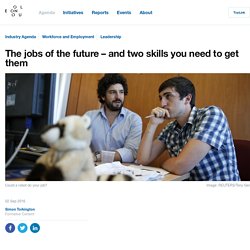
For more information, watch the Promise or Peril: Decoding the Future of Work session here. Could a robot do your job? Millions of people who didn’t see automation coming will soon find out the painful way. The answer is a resounding yes. The World Economic Forum’s Future of Jobs study predicts that 5 million jobs will be lost before 2020 as artificial intelligence, robotics, nanotechnology and other socio-economic factors replace the need for human workers.
Image: Reuters The good news is that those same technological advances will also create 2.1 million new jobs. Governments and employers in every sector are being urged to retrain and re-skill workers to avoid a crisis. New skills for new economies So what skills should workers be acquiring to make sure they have value as the Fourth Industrial Revolution gathers pace? Single-skillset jobs in decline Refocusing skills education Share. World’s Largest Hedge Fund Replaces Managers with AI. Larry Busacca/Getty Bridgewater Associates, the world's largest hedge fund, is building an artificial intelligence engine to automate the management of the company, according to a report in the Wall Street Journal.
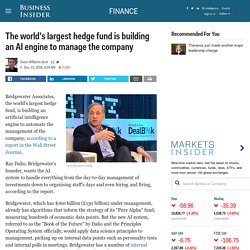
Ray Dalio, Bridgewater's founder, wants the AI system to handle everything from the day-to-day management of investments down to organising staff's days and even hiring and firing, according to the report. Robots Have Eliminated 6% of All US Jobs. 30% of Bank Jobs Lost in Five Years. Vikram Pandit, who ran Citigroup Inc. during the financial crisis, said developments in technology could see some 30 percent of banking jobs disappearing in the next five years.
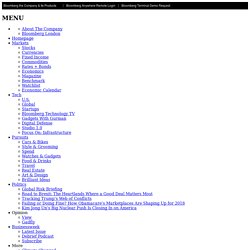
Artificial intelligence and robotics reduce the need for staff in roles such as back-office functions, Pandit, 60, said Wednesday in an interview with Bloomberg Television in Singapore. He’s now chief executive officer of Orogen Group, an investment firm that he co-founded last year. Gig Economy Has Grown 10 Times Over 2015. Majority of US Workforce Freelancing. 38% of US Jobs Lost to Automation Since 2017. 15% of Global Jobs Automated. 'Base-Level' Jobs Rare as Robots & Smart Systems Take Over. By the year 2030, artificial intelligence (A.I.) will have changed the way we travel to work and to parties, how we take care of our health and how our kids are educated.
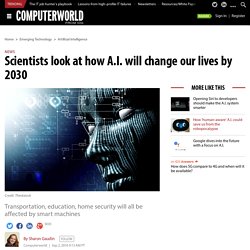
That’s the consensus from a panel of academic and technology experts taking part in Stanford University’s One Hundred Year Study on Artificial Intelligence. Focused on trying to foresee the advances coming to A.I., as well as the ethical challenges they’ll bring, the panel yesterday released its first study. The 28,000-word report, “Artificial Intelligence and Life in 2030,” looks at eight categories -- from employment to healthcare, security, entertainment, education, service robots, transportation and poor communities -- and tries to predict how smart technologies will affect urban life.
Late in 2014, Stanford researchers launched their One Hundred Year Study on Artificial Intelligence, or AI100. “Until now, most of what is known about A.I. comes from science fiction books and movies,” Stone said. UK Legal Sector Employs 114,000 Fewer Than 20 Years Ago. Its traditional aversion to risk has meant the legal profession has not been in the vanguard of new technology.

But it is seen as ripe for disruption — a view that is based not least on pressure from tech-savvy corporate clients questioning the size of their legal bills and wanting to reduce risk. Sample the FT’s top stories for a week You select the topic, we deliver the news. As more law firms become familiar with terms such as machine learning and data mining, they are creating tech-focused jobs like “head of research and development” or hiring coders or artificial intelligence (AI) experts. Change is being driven not only by demand from clients but also by competition from accounting firms, which have begun to offer legal services and to use technology to do routine work.
A study by Deloitte has suggested that technology is already leading to job losses in the UK legal sector, and some 114,000 jobs could be automated within 20 years. AI Displaces Around 20% of UK jobs, but Creates a Similar Number (PwC) Jack Ma's Prediction of the 16hr Working Week Becomes Reality. Jack Ma, the billionaire businessman and chairman of the Alibaba Group, believes that automation will help workers of the future enjoy more leisure time.
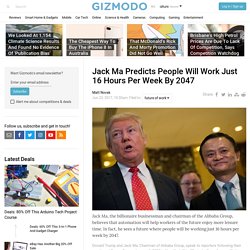
In fact, he sees a future where people will be working just 16 hours per week by 2047. Donald Trump and Jack Ma, Chairman of Alibaba Group, speak to reporters following their meeting at Trump Tower, January 9, 2017 in New York City (Photo by Drew Angerer/Getty Images) "I think in the next 30 years, people only work four hours a day and maybe four days a week," Ma said this week at a conference in Detroit. "My grandfather worked 16 hours a day in the farmland and [thought he was] very busy. We work eight hours, five days a week and think we are very busy. "